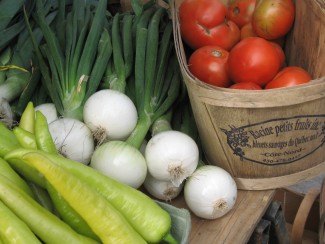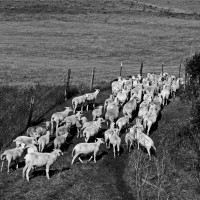I decided some time ago that I wish to eat as little as possible from the “industrial” food chain; that is to say, I wish to buy little food from factory farms which viciously and needlessly abuse the animals they produce and which degrade the earth in which they grow their plants. As a result, I buy as much of my food as I can—most of it—from farmers’ markets, from small stores, and directly from the farmers that have grown the food. It has been fairly though not totally easy to make this transition, and my health and the health of my local community are better for it.
In a sense my purchases are a protest against the types of farming I abhor, but in another sense—a more important one—my purchases merely reflect how I view the best allocation of my money, the type of farms I believe are best to buy from, and what I believe to be the healthiest food and purchases for both me and for the planet. These are simple and quantifiable reasons for how and why I spend my money, and are thus best understood by referring to Occam’s Razor: the simpler, the better.
Still more deeply, on a philosophical level, I shop for food the way I do in part because of my deeply held beliefs concerning self-governance: I cannot govern myself well if I cede so many acts of governance to people who I have never met, do not know, and cannot trust. In contracting others to grow my meat, my milk and my vegetables, I wish to keep this arrangement as closely and intimately as I can to myself and within my control. To purchase from an “industrial” chain is to engage in ignorance, uncertainty and recklessness, for it is almost impossible to know exactly what I am purchasing, and from whom I am purchasing it. To buy food locally, to learn from where it comes and who grows it, and how, is to replace that incomprehension with a sturdy bedrock of certainty, and the ability to exercise one’s own sovereignty rises in direct proportion to that transparency. The difference between corporate agribusiness and small local farms is all the difference between a Congressional caucus and a family meeting: from which gathering comes more clarity, efficiency and genuine progress? Which is better for the people involved?
Still, my beliefs and my way of life sometimes make people upset with me, and so my purchases and my philosophy can sometimes make for a lonely way of life. “You will never be able to feed the world on local food,” people sneer, “and anyways it is too expensive.” Of course, I am not interested in feeding the world on local food—I am interested in feeding the local community on local food. Yet critics often begin with this charge as if it actually means something. The jealous assumption seems to be that if I were to enjoy a fine rib-eye steak from my local farmer, then it must follow that the world should be able to enjoy it, and if my farmer cannot provide enough rib-eye steaks for the entire world, then he should close up shop and let the feedlots and the big slaughterhouses take care of things. Thus in one fell swoop is eliminated both the concept of local food and the concept of localism itself, the idea that different things work for different people in different places. And with the death of localism surely comes the death of local government and even self-government; why should it not?
The charge that local food is “too expensive” is also oft-cited, and, so far as I can tell, it is made solely by people who have never purchased local food, or who have purchased only a luxury item (such as a rib-eye steak) from a local farmer, deemed it too expensive, and returned immediately to the safety of National Beef, or Tyson’s, or whoever is selling the most food the most cheaply these days. But of course one has more options than a filet mignon or a similar cut. There are beef bones, chicken bones and chicken heads and feed and gizzards and necks—all things that could be used to make hearty, healthy soup stocks to which one could add a modest amount of meat and vegetables and grains, and for an astonishingly low price; surely the price is lower per calorie and per nutrient than one could buy from a stock can in the grocery store. Yet having been proven wrong on price, people will instead switch to the contention that local food “takes too much time,” by which of course they mean they are unwilling to assume personal responsibility for the preparation of their own low-cost, high-nutrient-density meals; they would prefer the supermarket suppliers take care of that troublesome business, no matter how unhealthy or economically inefficient it may be. So we have gone from, “I cannot afford it,” to “I do not really care to do it.” Thus do we make the transition from helplessness to bad self-government, which is not a great conversion but is an easier one to quantify.
To purchase “industrially,” of course, is not to abandon or mock the principles of self-government and individual sovereignty and local community, but it does these latter things some harm, and not an immeasurable amount of harm. The tenets that underlie the one are in direct competition and contrast with the tenets that underlie the other; one can partake in both economic and ideological strains to some degrees, but the result will be two doctrines that do not mesh Ultimately, one must triumph over the other. This outcome will depend not solely on what we purchase, and from where, but also in how we think about what we purchase, and how we examine the effects our purchasing dollars have on ourselves, each other, and the larger world.






10 comments
Ben
Daniel,
Enjoyed reading your thoughts and observations on the connections between self governance and how we elect to feed ourselves. I’ve written something, link included below, which discusses the scale and role of “localism” when creating policy.
http://www.mackinawvalleyinstitute.org/2013/05/overcoming-apathy-role-of-place.html
David Smith
Matt, you say, “The problem with localism of any stripe is that it takes something which should come naturally if it comes at all and turns it into an ideology. There are legitimate criticisms to make of large-scale food production, particularly that it is subsidized by a bewildering array of taxes and redistributions, but past the removal of this network you really have to live and let live with what other people decide to do.”
I have some sympathy for what you’re saying here, if I’m understanding you correctly. My suspicions grow exponentially at the point something – anything – becomes an “ism”, and therefore a movement (or ideology). But the idea that this is impractical for urban areas is only partly true; witness urban farming being tried quite successfully throughout many large cities. Still, what did cities do prior to agri-business? Somehow, there was some kind of interdependency with the surrounding countryside, surely (The countryside, BTW, that central planners see as mere raw material for their revenue streams in funding their forms of “progress”)! But let me also say the unthinkable – at least to modern sensibilities of “progress” as expressed in urbanization and suburbanization – perhaps many of our cities are simply too big and need to be pared down.
There are such things as limits, after all, and if we won’t place proper limits on ourselves, Reality always has a way of asserting itself in the long run.
I suppose there are those localist greenies, who, paradoxically, seek to use government regulations to enforce and enhance localism (Yes, I know, I’m using the “ism” form of the word!), but most that I know only want to be left alone to interact and trade in our communities without the overweening interference of government, be it the local, state, or federal variety.
Matt
The point of the “you can’t feed the world with local food” criticism is that buying 100% local is only possible for certain areas, due to reasons of climate, density, and preference. You can’t really expect the Boston-DC corridor to ever feed itself “locally”, unless locally means all of the eastern seaboard. For that matter, 100% localism would mean a lot of arable farmland in the midwest goes to waste.
Here in the Pacific Northwest, you can get good local produce in the summer, but unless you are going to eat nothing but potatoes and turnips for the long winter you are forced to go elsewhere (some ambiguity in the term “local” here: east of the Cascades the growing season is longer). And what if you’re craving a pineapple?
The problem with localism of any stripe is that it takes something which should come naturally if it comes at all and turns it into an ideology. There are legitimate criticisms to make of large-scale food production, particularly that it is subsidized by a bewildering array of taxes and redistributions, but past the removal of this network you really have to live and let live with what other people decide to do.
John Gorentz
Yes, the problem with Earl Butz was that he was too much of a free market libertarian. Same problem as with Stalin and Castro.
RME.
Brad Wilson
Re. David Smith: Industrial food is not subsidized (net result), it’s penalized. It’s not “King,” it’s a pauper.
Re. Daniel Payne: Other important issues affect these issues. Economically, farm commodity markets don’t self-correct as conservative, libertarian ideology claims. As a result, the market enables mega-industrial firms to exploit farmers, setting low standards upon which local premiums can be paid. Cheap corn, milk, cotton, wheat, soybeans require better fixes, which we had, with the New Deal Farm Programs. We can go there again, eliminating the need for subsidies, and placing local food on a stronger foundation. Unfortunately, the US Food Movement has a libertarian bent, thinking that ‘free’ market solutions (merely cutting subsidies, returning to “Hooverism,”) will be adequate. Yea, Earl Butz made those claims, boldly, during the 1970s, and then he was proven wrong, massively, every year for a quarter century, and on for 30 years for most of the crops. There’s food for though here. Michael Pollan has tweeted it as “The Conservative Case for Local Food.” But like Pollan’s own libertarianism, a broader perspective is needed. For data on the economic issues I’ve mentioned here, see “Michael Pollan Rebuttal: Four Proofs Against Pollan’s ‘Corn Subsidy’ Argument.”
John Gorentz
We like to buy local food, too. Some we grow ourselves, some we buy a local farmer’s markets. My wife sometimes gets phone calls from the guy we call our Amish telemarketer, letting us know what he has available. (There are a lot of Amish farms here in some of the counties of southwest Michigan, but not so many Amish people farm for a living anymore.) We also get eggs for $3/dozen from a former colleague who raises them, semi-free range style.
We do this despite the fact that the increased transportation costs of locally grown food make for a greater carbon footprint, and that buying organically grown food means we’re pressuring more land to be plowed up and put into food production. We do it because we’re selfish and enjoy the food. Also, we’re glad to sacrifice other people’s environmental concerns for our own health. Also, I don’t care for what big agribusiness has done to our social and political arrangements, even if it feeds more people more cheaply. Not worth the cost, IMO.
BTW, I’m currently reading a fascinating book, “Darwinian Agriculture: How Understanding Evolution Can Improve Agriculture” by R. Ford Denison. I’ve found it to be quite a page turner, in part because it’s about topics that are the subject of research at my workplace, and in part because it’s just plain interesting. Some of the guy’s recent lectures are on YouTube, and a radio interview with Carl Zimmer of NPR is online, too. He does touch on some locavore issues.
David Smith
Mr. Payne, you write, “’You will never be able to feed the world on local food,’ people sneer, ‘and anyways it is too expensive.” Of course, I am not interested in feeding the world on local food—I am interested in feeding the local community on local food. Yet critics often begin with this charge as if it actually means something. The jealous assumption seems to be that if I were to enjoy a fine rib-eye steak from my local farmer, then it must follow that the world should be able to enjoy it, and if my farmer cannot provide enough rib-eye steaks for the entire world, then he should close up shop and let the feedlots and the big slaughterhouses take care of things.”
My feelings precisely! Forget about this abstraction called “the world”, I say! The implication here is that only some kind of central planning can adequately take care of our needs. No! It is MY responsibility to take care of feeding me and my family, not some central planner! The fact that it is now more difficult to do so via local farmers says more about our defective world view and, as you so well observe, our willingness to cede our responsibilities to these centralizers so we may enjoy the convenience of the industrialized system.
The bottom line here is subsidization. Industrialized food is subsidized at many levels; the local farmer is not. This needs to stop.
Daniel
Hi Ian,
I have indeed read that book—I was champing at the bit to get it when it came out. It was interesting, well-researched and, best of all, I really liked the authors; they seemed like good folks. But I was not satisfied by their conclusions. They relied a lot on the notion that local foodism is a form of “autarky,” or government-imposed self-sufficiency; needless to say, I didn’t follow that line of thought. They were also given to the idea that local food would herald a new era of famines, but (if I remember correctly) they did not give enough attention to the way in which industrial agriculture engenders famines, i.e. how the exhaustion of the soil via monoculture and chemical application had a direct hand in the drought-cum-corn failure last year. There were other problems I had with the book; maybe I can dust it off and look over it again. Did you like it?
Thanks so much for reading and commenting!
Chris Schumerth
Ian, can you summarize for us?
Ian Hugh Clary
Hi Daniel. I’m not sure how lonely you are, it strikes me that a lot of people are practicing local food-buying. I wondered if you read “The Locavore’s Dilemma: In Praise of the 10,000 Mile Diet” by Pierre Desrocher and Hiroko Shimizu? It is an argument against the basic point of your post. Desrocher teaches at the University of Toronto, and this book arrived in Canada with some controversy. I’d be interested to see if it changed any of your perspective.
Comments are closed.